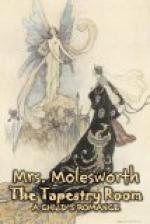She was spinning busily. She did not look up as the children came in. She seemed quite absorbed in her work. So the children stood and gazed at her, and the cats stood quietly in front, the right-hand one before Hugh, the left-hand one before Jeanne, not seeming, of course, the least surprised. Whether I should call the white-haired lady an “old” lady or not, I really do not know. No doubt she was old, as we count old, but yet, except for her hair, she did not look so. She was very small, and she was dressed entirely in white, and her hands were the prettiest little things you ever saw. But as she did not look up, Hugh and Jeanne could not at first judge of her face. They stood staring at her for some minutes without speaking. At last, as they were not allowed to be surprised, and indeed felt afraid of being reproached with bad manners by the cats if they made any remarks at all, it began, especially for Jeanne, to grow rather stupid.
She gave Hugh a little tug.
“Won’t you speak to her?” she whispered, very, very softly.
Instantly both cats lifted their right paws.
“You see,” replied Hugh, looking at Jeanne reproachfully, “they’re getting angry.”
On this the cats wheeled right round and looked at the children.
“I don’t care,” said Jeanne, working herself up. “I don’t care. It’s not our fault. They said she was waiting for us, and they made us come in.”
“‘She is the cat,’ so I’ve been told,” said a soft voice suddenly. “And ‘don’t care;’ something was once spun about ‘don’t care,’ I think.”
Immediately the two cats threw themselves on the ground, apparently in an agony of grief.
“She the cat,” they cried. “Oh, what presumption! And who said ’don’t care’? Oh dear! oh dear! who would have thought of such a thing?”
The lady lifted her head, and looked at the cats and the children. There was a curious expression on her face, as if she had just awakened. Her eyes were very soft blue, softer and dreamier than Hugh’s, and her mouth, even while it smiled, had a rather sad look. But the look of her whole face was very—I can’t find a very good word for it. It seemed to ask you questions, and yet to know more about you than you did yourself. It was impossible not to keep looking at her once you had begun.
“Hush, cats,” were the next words she said. “Don’t be silly; it’s nearly as bad as being surprised.”
Immediately the cats sat up in their places again, as quiet and dignified as if they had not been at all put about, and Jeanne glanced at Hugh as much as to say, “Aren’t you glad she has put them down a little?”
Then the lady looked over the cats to the children.
“It is quite ready,” she said; “the threads are all straight.”
What could they say? They had not the least idea what she meant, and they were afraid of asking. Evidently the white lady was of the same opinion as the cats as to the rudeness of being surprised; very probably asking questions would be considered still ruder.




